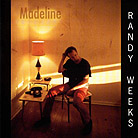June 2000
Beats me. We all have a line that shouldn’t be crossed, and we rarely agree on where it should be drawn (or, for that matter, what it should be drawn in). In Randy Weeks’ new album, Madeline, there is something for everyone to love and probably something for many to hate. Vocals and music normally should be considered as an integrated whole. The words don’t evoke the same response, cognitive or emotional, when read from a piece a paper. They also take on different meanings based on musical style and arrangement. Think of the line "you’re mine" crooned by a Vegas act and shouted by hard-core rapper. Further, consider a particular melody and arrangement without words, or with two different sets of lyrics. The music "sounds" differently in all three cases, even if nothing else changes but the absence or substance of lyrics. On Madeline, however, the contrast between words and music is so stark that both beg to be considered separately. Madeline gets my toes tapping and my head worrying. Let’s consider the music first. There isn’t a dud on the album. All of the songs feature choruses with great hooks. Weeks uses standard straight-ahead road-house roots-rock arrangements, then throws in a few curves. Several of the songs, such as "Gimme Back My Soul" and "Get Back to Me," sound like Weeks traveled to Nashville after a long stop over in Memphis because of their heavy R&B influence. Weeks’ voice, high pitched and slightly thin, is reminiscent of an Everly Brother gone solo. Even with some satisfying harmonies supporting him, he still sounds like a boy singing men’s songs. That’s not a knock; he isn’t a shouter, a pouter, or a growler, which is too often the case for singers in this genre. In fact, he sounds happy. Which is were the words come in. Many songs have overly macho, if not misogynist themes. On the title track, Weeks boasts, without swagger, that "I’m going to muscle in to all your hiding places" and "Ain’t brakin’ for no highway sign" (including, presumable, "Stop" "Yield," or "Rest Area Ahead"). Does he care for the woman he’s singing about? Yes. But he sure sounds like he wants to take charge of her. On "If I Cut You," he says, "you wouldn’t bleed." Ouch. "Don’t Step Away" could be a request or a threat. Then there’s "Can’t Let Go." It’s about an obsessive ex-lover at best, a stalker at worst. Sexist? Hardly. Lucinda Williams’ cover of the song was rightfully nominated for a Grammy (and wrongfully didn’t win). But here’s an example of why words and music and arrangements can’t really be separated. Williams’ version, with its moaning slide guitars and cracking vocal, is about a really bad case of the blues. Weeks’ take, on the other hand, is a flat-out country rock stomp. Is he bummed? He doesn’t appear to be. The happy stalker? Maybe. But does Weeks’ music generally put a slant on his words that wouldn’t otherwise be there? In the end, I don’t know whether listeners should be enthralled with Weeks’ enthusiasm, quality song writing, and vocal harmonies or repelled by his lyrics. Or both. It all depends on how one interprets the songs. I know I’ll play the album many more times because of the great tunes and performances, and I’ll probably feel guilty every time I do. GO BACK TO: |
 Randy Weeks - Madeline
Randy Weeks - Madeline![[Reviewed on CD]](../format/regcd.gif) Is
country music made by men inherently sexist? Does it matter if the singer doesn’t
really mean what he’s singing? How can one tell? If you can dance to it, is there any
point in thinking about it?
Is
country music made by men inherently sexist? Does it matter if the singer doesn’t
really mean what he’s singing? How can one tell? If you can dance to it, is there any
point in thinking about it?